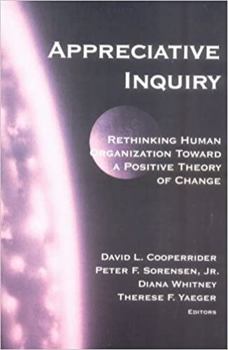Appreciative Inquiry: Rethinking Human Organization Toward a Positive Theory of Change
Book by David L. Cooperrider, Peter F., Jr. Sorensen, Diana Whitney, Therese F Yaeger This description may be from another edition of this product.
Format:Paperback
Language:English
ISBN:0875639313
ISBN13:9780875639314
Release Date:January 2000
Publisher:Stipes Publishing, LLC
Length:287 Pages
Weight:0.95 lbs.
Dimensions:0.6" x 6.1" x 9.1"
Customer Reviews
2 ratings
AI Source - a collection of important papers
Published by Thriftbooks.com User , 23 years ago
The method of appriciative inquiry is something that any organisation should envisage. The idea of focussing on the positive aspects and to grow from the is very powerful (in fact, I spent the last issue of my 7EQ newsletter on this topic). The number of awards won by authors and projects described in thsi book only confirms this statement. This book will explain you the why's of AI, give you some cases and show its relation to other large scale methods. It's not meant as a book you'll read from coer to cover, but rather as a resource from which you'll get what you need. The 18 chapters of this book are in fact 18 papers, some are written especially for this book, some have been published elsewhere, starting with the original "Appreciative Inquiry" Paper by David Cooperrider and Suresh Srivastva (1987). Many of the other papers have been published in the OD Journal and the OD practitioner between 1995 and 1998.
OD perspective on AI case studies, relevance, and future
Published by Thriftbooks.com User , 25 years ago
This is a concise book filled with practical AI examples from manufacturing, finance, academia, and not-for-profit organizations -eighteen short chapters that get to the point. It does an excellent job emphasizing strengths and weaknesses of the AI approach in Organization Development (OD) work. This provides readers with AI insight on theory, application and results from recent fieldwork. Experienced AI readers will enjoy the new empirical work and extensions of the AI approach to new applications. Previous AI books, such as the Thin Book of AI, and the Field guide to AI, focus more on methodology and process. Cooperider, Sorensen, Whitney and Yaeger's book has three key parts: theory, application (case study), and "what's next" for AI (new horizons). The book really shines in Parts II and Parts III where it provides condensed field research with organizations such as Wendy's International, Commonwealth Edison, Benedictine University and Chicago area gangs. Two strong chapters are David Jones' empirical work at Wendy's international (ch. 13) and James Ludema's chapter (ch. 18) on "hope". Jones' chapter provides some strong empirical evidence supporting AI's value. Ludema's chapter lends value by illustrating AI's contribution to a better world through a relational construct such as "hope". Finally, OD'ers should read Ch. 14, which tests AI within traditional OD interventions as well as suggesting its' merits under positivistic inquiry. Just under 300 pages, the book is an easy read an provides a little something for every reader. It presents AI through the OD lens, and does a nice job strengthening AI's relevance in the field through empirical case work and future implications. Reader's may find they want to know more about particular case studies or concepts presented, for the book's chapters are short -especially in Parts II and III. Some of the chapters would be good books in themselves. Overall, it is great read for those who need case evidence of AI and want an overview of theory and application, as well as intermediates (students, consultants, managers/leaders) who are looking for empirical research, new applications, and a status report on this powerful Organization Development approach.






